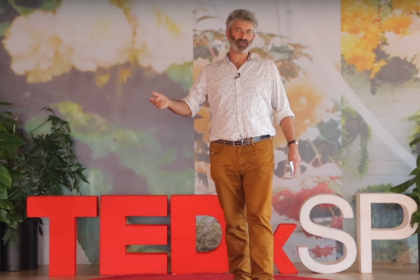
It’s absurd to call fermentation a new food trend, says Sandor Ellix Katz, author of “The Art of Fermentation” and “Wild Fermentation.” Fermenting practices date back to early man. But, after decades of active pasteurization and a war on bacteria, fermentation is experiencing an awareness as a food phenomenon, Katz says.
Katz – who calls himself Sandorkraut, the fermentation revivalist – spoke at a TEDx Talk in Sao Paulo on wild fermentation and the power of bacteria. Coffee, bread, cheese, beer, wine – Katz points to these as examples of “the greatest delicacies that people around the world enjoy, products of fermentation that have never gone out of style and have not recently just come into style.”
No one needs to master biology or study microorganisms to practice fermentation, Katz stresses. Before microbiology became a field, fermentation historically was viewed as mysterious or mythical because no one understood the mechanisms of it. He adds: “I cannot find one single example of a culinary tradition anywhere the does not incorporate fermentation.”
Microbiology has illuminated and harmed fermentation. For decades, the information surrounding bacteria and microorganisms was negative. People were taught the dangers of bacteria and disease – and grew to fear fermentation. But discoveries in microbiology also found that everything we eat, plant and animal, is populated by microorganisms. All life is descended and created from bacteria.
“In a way, we’re bacteria super structures,” Katz said. “For the first time, from the scientific analysis, we began to understand that fermentation is the transformative action of microorganisms.”
Fermentation often gets a bad reputation because people consider fermenting the process rotten or spoiled food. But fermentation is manipulating environmental conditions to encourage the growth of good organisms and discourage the growth of bad organisms, Katz explains.
“Fermentation is making food that is more stable than the raw product of agriculture that we began with,” Katz says. “We’re creating something that is more delicious, we’re creating something that is more easily digestible, we’re creating something where some toxic compound in the food and the otherwise dangerous food is made safe.”
For the first time in history, science is revealing the benefit of eating the live bacteria in fermented foods. The prevalence of antibiotic drugs, antibacterial cleaning products and chlorinated water now kill all bacteria in food. This war on bacteria narrows the diversity of bacteria in our intestines, Katz points out.
“If they were to kill all those microorganisms, we couldn’t possibly exist because we rely on those microorganisms for our digestion, for our immune system, our ability to withstand disease our brain chemistry,” he says. “Yet this chemical exposure…narrows biodiversity that we have inside of us.”
Katz focuses his work on public education of fermentation, helping shed light on its safety and effectiveness. More people today are seeking fermented foods because of the growing recognition of the benefits fermentation, Katz says. He teaches that the greatest benefit of fermented products are the bacteria themselves. Eating fermented foods – foods that haven’t been cooked or heat processed, since that kills the bacteria – restores the biodiversity in our intestines.
“In addition to being this important mode of transformation of food and beverages which enables people to make effective use of the food resources that are available to them, fermentation is also an engine of social change. And all of us are the starter cultures,” Katz said.
